|
|
|
Sort Order |
|
|
|
Items / Page
|
|
|
|
|
|
|
| Srl | Item |
| 1 |
ID:
101138
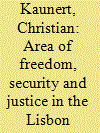

|
|
|
|
|
| Publication |
2010.
|
| Summary/Abstract |
Scholars may rightly claim the European Union's (EU) area of freedom, security and justice (AFSJ) has become one of the most significant developments in the European integration process. The Lisbon Treaty (LT) has the potential to push the AFSJ towards tremendous growth, and has provided the policy area with instruments that were unthinkable after the third pillar was created during the Maastricht Treaty negotiations. This article investigates the role of the European Commission in the process of constructing an 'AFSJ'. It argues that the Commission (through alliances with other institutional actors) managed to incrementally contribute to this shift in political norms. This shift derived from the policy-making level from 1999 onwards. It manifested itself specifically during the negotiations of the Constitutional Treaty (CT) and the subsequent re-negotiation of the LT. Here, the Commission acted with the support and the use of other supranational actors during the Convention, without which this result would have been difficult, if not impossible, to obtain. Firstly, the article will deal with the main advances of the CT which resulted in the LT. Subsequently, the role of the Commission and other EU institutional actors will be examined, resulting in an overall evaluation.
|
|
|
|
|
|
|
|
|
|
|
|
|
|
|
|
| 2 |
ID:
154838


|
|
|
|
|
| Summary/Abstract |
The 2009 Lisbon Treaty institutionalised an intergovernmental constitution for managing policies traditionally a matter of national sovereignty, such as foreign and defence policies. However, important innovations were introduced in the foreign policymaking structure to limit its intergovernmental logic, in particular, with regard to the role of the High Representative (HR). It was generally assumed that those innovations would have made development of a coherent EU foreign policy possible. Yet, in one of the most significant tests for the EU’s foreign and defence policies in the post-Lisbon era, namely the Egyptian crisis (2011-14), those reforms did not work as expected. Notwithstanding the innovations, the HR’s role was diminished by the European Council’s strict control over foreign policy toward Egypt. The lack of clear policy guidelines towards the issue of democratisation in the Arab world in the 2003 European Security Strategy, although partially mitigated by the European Neighbourhood Policy and the Barcelona Process/Union for the Mediterranean, made it even more difficult for the HR to bring a European perspective into the largely intergovernmental setting.
|
|
|
|
|
|
|
|
|
|
|
|
|
|
|
|
| 3 |
ID:
137418


|
|
|
|
|
| Summary/Abstract |
Noting that European Union (EU) institutions are increasingly engaged in civil protection in the member states, security governance is used as an analytical framework to assess the depth of EU engagement in delivering civil security. It is shown that a state-centric approach is no longer adequate to understand the provision of civil security across Europe. To varying degrees, the EU has acquired responsibilities to facilitate, coordinate, manage, and regulate civil security, whether before or after a civil crisis occurs. The analysis demonstrates that, whilst intergovernmental practices and inter-state cooperation remain salient features of civil security, the responsibilities undertaken by the EU institutions across the entire policy spectrum are more substantial than a strictly intergovernmental perspective would suggest.
|
|
|
|
|
|
|
|
|
|
|
|
|
|
|
|
| 4 |
ID:
113549


|
|
|
|
|
| Publication |
2012.
|
| Summary/Abstract |
In an article previously published by the APSR, Carrubba, Gabel, and Hankla claim that the decision making of the European Court of Justice (ECJ) has been constrained-systematically-by the threat of override on the part of member state governments, acting collectively, and by the threat of noncompliance on the part of any single state. They also purport to have found strong evidence in favor of intergovernmentalist, but not neofunctionalist, integration theory. On the basis of analysis of the same data, we demonstrate that the threat of override is not credible and that the legal system is activated, rather than paralyzed, by noncompliance. Moreover, when member state governments did move to nullify the effects of controversial ECJ rulings, they failed to constrain the court, which continued down paths cleared by the prior rulings. Finally, in a head-to-head showdown between intergovernmentalism and neofunctionalism, the latter wins in a landslide.
|
|
|
|
|
|
|
|
|
|
|
|
|
|
|
|
| 5 |
ID:
123656
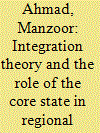

|
|
|
| 6 |
ID:
111023


|
|
|
|
|
| Publication |
2012.
|
| Summary/Abstract |
The global financial crisis of the late 2000s has affected the EU and East Asia differently. The EU has seen its economic, political and social structures undermined by the problems derived from the global crisis and subsequent eurozone sovereign debt crisis. In contrast, East Asia has gone through the global crisis relatively unscathed and has seen its standing at the global level reinforced. As a result, there has been a reconfiguration of leadership, decision-making and governance structures in both regions. In the case of the EU, Germany has emerged as the clear leader of European efforts to solve regional economic problems. Meanwhile, intergovernmentalism has replaced supranationalism as the decision-making and even implementation procedure of choice. Differently, there is no single leader in East Asia. China has become one of the most important powers at the global level, but at the regional level, different countries have shaped East Asia's response to the crisis. Concurrently, there has been some move towards increasing integration, even though intergovernmentalism still defines governance structures in the region. Thus, the global financial crisis of the late 2000s has helped to shape new leadership, decision-making and governance structures in both regions.
|
|
|
|
|
|
|
|
|
|
|
|
|
|
|
|
| 7 |
ID:
101143
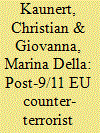

|
|
|
|
|
| Publication |
2010.
|
| Summary/Abstract |
The European Union counter-terrorist financing (EU-CTF) regime has experienced significant developments since 2001. This article builds on the notion of supranational policy entrepreneurship (SPE) in order to investigate the post-9/11 development of EU-CTF regime. Admittedly, counter-terrorism is a policy area in which supranational institutions have rarely taken the lead, nor consistently been very active. However, the article suggests that, despite the centrality that member states maintain in the policy-making process, European institutions, notably the European Commission and the Council Secretariat, have been significant in EU-CTF cooperation. While the European Commission and the Council Secretariat both played the role of an SPE, the article outlines the different ways in which this occurred. Empirically, the article challenges an intergovernmentalist perspective by examining the implementation of United Nations Security Council resolutions and Financial Action Task Force recommendations on countering terrorist financing at the EU level.
|
|
|
|
|
|
|
|
|
|
|
|
|
|
|
|
| 8 |
ID:
095475
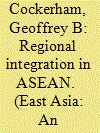

|
|
|
|
|
| Publication |
2010.
|
| Summary/Abstract |
This paper investigates regional integration in the Association of Southeast Asian Nations (ASEAN) by analyzing the agreements developed within the ASEAN framework since its founding in 1967. This examination reveals that, although integration in ASEAN is certainly influenced by norms and values, the integration process can be best understood by intergovernmentalism. While many agreements have been developed within the ASEAN framework and have become more legalistic in nature, they tend to mostly be in functional areas and exhibit low levels of transparency and delegation. The design of ASEAN is indicative of an overriding concern for state sovereignty as a key strategic interest for member states.
|
|
|
|
|
|
|
|
|
|
|
|
|
|
|
|
| 9 |
ID:
125268
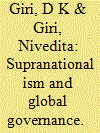

|
|
|
|
|
| Publication |
2013.
|
| Summary/Abstract |
A globalised world has problems which are global in their spread and consequences. Logically then, such problems will require solution that can be delivered only by global initiatives and institutions, or in other words, global governance. But, what is global governance? Global governance is based mainly on intergovernmentalism, which negotiates respective national interests, but does not secure common interest.
|
|
|
|
|
|
|
|
|
|
|
|
|
|
|
|
|
|
|
|
|